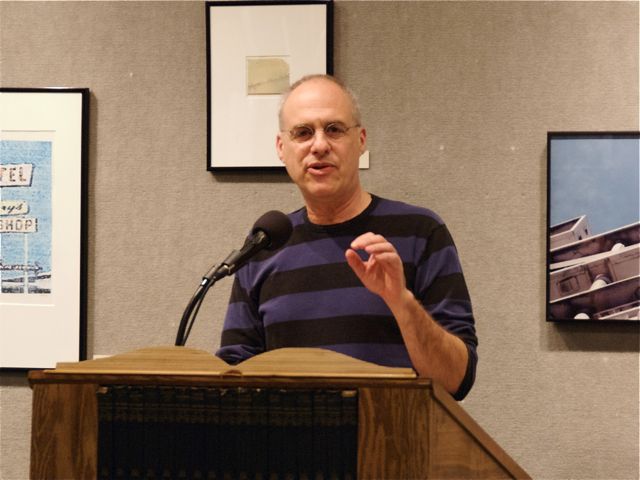
reference-image, l
(article, Kim Carlson)
[%pageBreakSettings nobreak=true] Mark Bittman may not be the nation's most beloved cookbook author; that honor probably goes to someone cuddlier, like Rachael Ray or Ina Garten. But he may just be Portland's fave. Last Thursday night, when Bittman — of cookbook, newspaper, and television fame — appeared in town to promote his new book, Food Matters, at Powell's Books, the crowd was standing-room-only. Looking at the rapt faces of most of those in attendance, it was clear to me that he had found his congregation. [%image reference-image float=right width=400 caption="Mark Bittman at Powell's Books."] Not that Bittman was preaching. Although I haven't read Food Matters cover to cover, I've spent enough time with it to know that while it's billed as a "guide to conscious eating," it's anything but didactic. Bittman's call to better eating is summarized in the book's introduction: bq. If I told you that the same lifestyle choice could help you lose weight, reduce your risk of many long-term or chronic diseases, save you real money, and help stop global warming, I imagine you'd be intrigued. If I also told you that this change, while not effortless, would be easier and more pleasant than any diet you've ever tried, would take less time and effort than your exercise routine, and would require no sacrifice, I would think you'd want to read more. If you do, you'll find an explanation of the links among diet, health, the environment in general, and climate change in particular, and you'll see how you can make a difference. What lifestyle choice is he talking about? Reducing our meat consumption, or what Bittman good-humoredly calls "lessmeatarianism." Bittman came to his Powell's lecture armed with plenty of statistics. The average American, he said, eats about 1/2 pound of meat plus about 1 1/2 pounds of other animal products (think cheese, milk, and eggs) each day, totaling about 2 pounds of animal-based food. Since the typical person eats about 3 pounds of food per day, that means only one-third of the average American diet is not_ animal-based. Of that lone non-animal pound, half is what Bittman called "junk" (soda, sweets, white-flour-based concoctions, chips), and the other half is plant-based. Which means (quick math here) that one-sixth of our diet is plant-based. And that, said Bittman, is the big problem: We all need to eat more plants. If all this sounds reminiscent of Michael Pollan and his book In Defense of Food — "Eat food. Not too much. Mostly plants" — it's on purpose. Pollan's work has clearly has inspired Bittman — and Bittman said so — although they haven't conspired or collaborated. Instead, each author takes a different approach to a similar topic. For one thing, Pollan doesn't talk as much about meat as Bittman. And Bittman doesn't talk as much about local foods as Pollan. But they share the conviction that the food system in America is derailed. Eating so much meat, Bittman told his audience, is wrong on at least two counts. It's bad for our health, which requires a better balance of foods. And it's wrong for the planet, because we can't possibly sustain this level of meat-eating with the amount of farmland that's left — especially if we consider that people in other countries want to eat similar quantities of meat, too. And then he mentioned the 10 billion animals we kill each year. "What if we killed nine billion next year?" he asked. "And the year after that, eight billion?" Bittman espouses incremental over drastic change, believing swift, drastic change unlikely but gradual change eminently doable. All of which endeared me to him, along with his self-deprecating sense of humor and the way he called us "lovely Portland people." One thing I especially appreciate in his new book is that he takes a practical approach. In the same manner as the book Grub, half of Bittman's book is a food-politics-and-health manifesto, while the other half is full of recipes, showing how to put that manifesto into action in the kitchen. Some of the recipes are little more than instructions for making, say, a good three-ingredient dressing for grains or greens, but still, Bittman is demystifying the process. And in a country that either fetishizes food or is afraid of it, demystification is desperately needed. I have to add that in many ways, Bittman's new message matches what we're trying to achieve with Culinate: connecting the dots between eating well for our bodies and for our planet. So while some may think that Mark Bittman's current dietary regimen doesn't go far enough — even though his diet helped him lose 30 pounds and improved his health — I applaud him and look forward to hearing more from him. After all, conscious eating is but the first of many steps we'll all need to take in the coming years if we're going to do right by our world and ourselves. p(blue). Editor's note: Head over to Cooking Up a Story to see an interview with Bittman when he was in Portland.

reference-image, l